Review: Lipscomb University Theatre's GODSPELL Filled With Heart and Soul
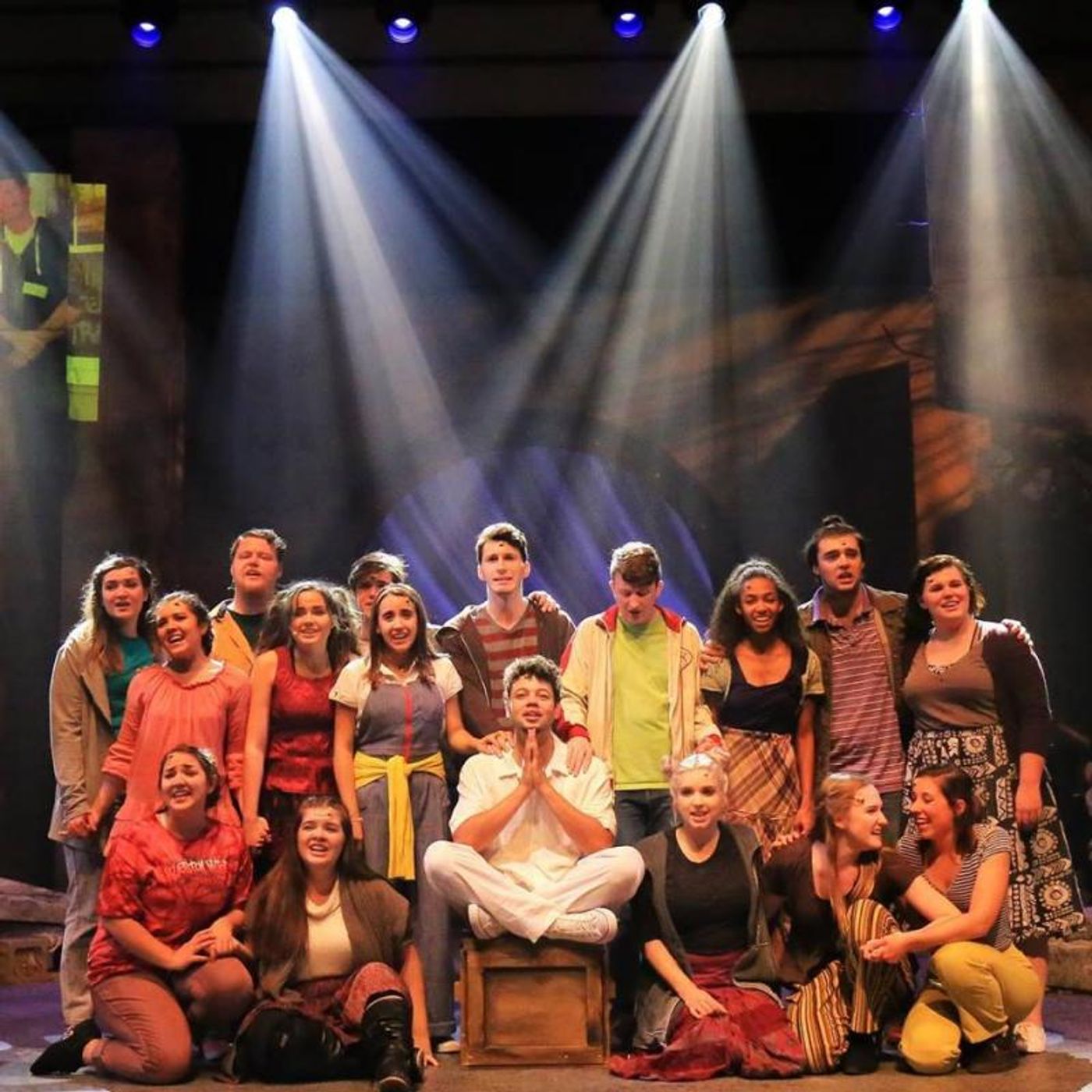 Patriq James' graceful portrayal of Jesus Christ in Lipscomb University Theatre's production of Godspell - now onstage in Collins Alumni Auditorium on the school's Nashville campus - shines like a beacon in the very center of the show, providing the very heart of every story told by director Scott Baker's 17-person cast. But if James provides the show's heart, it is perhaps the members of Baker's ensemble, which includes a deft blending of experienced student actors with an assortment of newcomers to their company, who provide its soul.
Patriq James' graceful portrayal of Jesus Christ in Lipscomb University Theatre's production of Godspell - now onstage in Collins Alumni Auditorium on the school's Nashville campus - shines like a beacon in the very center of the show, providing the very heart of every story told by director Scott Baker's 17-person cast. But if James provides the show's heart, it is perhaps the members of Baker's ensemble, which includes a deft blending of experienced student actors with an assortment of newcomers to their company, who provide its soul.
Energetic and enthusiastic, Baker's cast performs the musical retelling of the parables of Christ, which come primarily from the Gospel of St. Matthew (although there are a few which may only be found in the Gospels of St. Luke and St. John), propelling the show forward with passion and commitment that results in perhaps the finest production of Godspell we've ever witnessed. That achievement alone is noteworthy: Godspell has been rightfully criticized since its 1971 off-Broadway premiere for its lack of a plot and its meandering tale of the teachings of Christ and his ultimate betrayal by Judas Iscariot. Originally written for a student performance at Carnegie-Mellon University by John Michael Tebelak, the libretto was given a professional burnish by Stephen Schwartz for its subsequent off-Broadway debut.
The story of the relationship of Jesus and Judas has provided the source of inspiration for writers for thousands of years, to varying degrees of success. And the often-revived Godspell continues to engender all manner of responses from audiences, critics and scholars alike. However, the emphatic performance delivered by the student cast of Lipscomb University Theatre, led by the reassuring presence of the enigmatic James as the equally enigmatic Christ, might quell the outcries of nay-sayers who find little about the show to appreciate. While it is unlikely to change the minds of any non-believers in the audience, Godspell will certainly provoke thought and introspection, providing some sense of resolution afterward, perhaps, or at the very least, a greater appreciation of Christ's teachings.
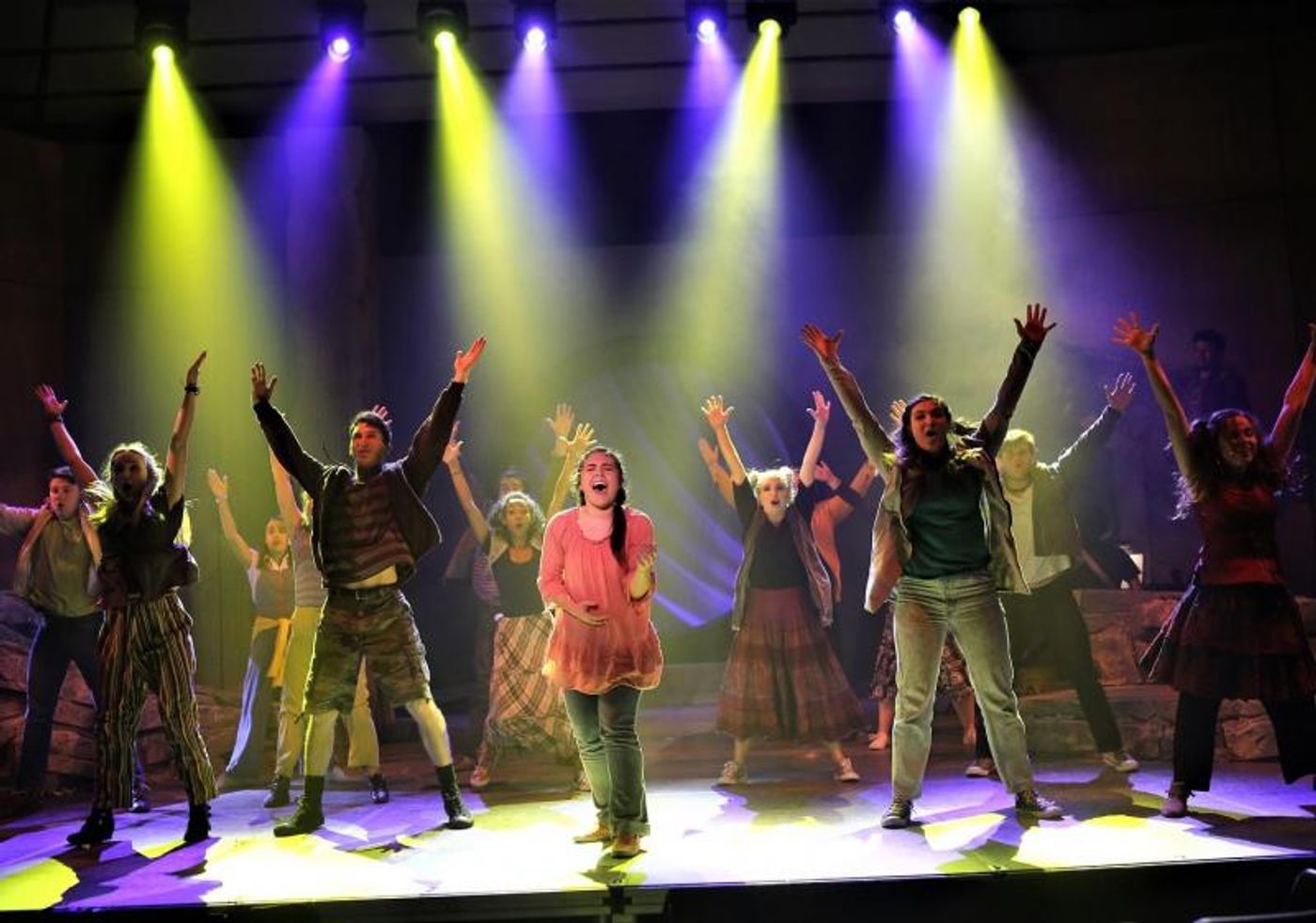 From the very first moments of Baker's production - performed amid the beautiful setting provided by set designer Andy Bleiler, which is sumptuously lit by designer Stephen Moss - the audience is drawn into the story of Godspell through an immersive retelling of it. Drawing upon his own experiences of growing up in the Middle East, Baker imbues the production with a contemporaneous sense of "you are there," via projections that place the action squarely upon the lands where it originally took place. Like most directors of Godspell, Baker takes advantage of the opportunity to give his production its own unique flavor that renders it far more compelling than it could have been, had he chosen instead to make the setting a modern American city.
From the very first moments of Baker's production - performed amid the beautiful setting provided by set designer Andy Bleiler, which is sumptuously lit by designer Stephen Moss - the audience is drawn into the story of Godspell through an immersive retelling of it. Drawing upon his own experiences of growing up in the Middle East, Baker imbues the production with a contemporaneous sense of "you are there," via projections that place the action squarely upon the lands where it originally took place. Like most directors of Godspell, Baker takes advantage of the opportunity to give his production its own unique flavor that renders it far more compelling than it could have been, had he chosen instead to make the setting a modern American city.
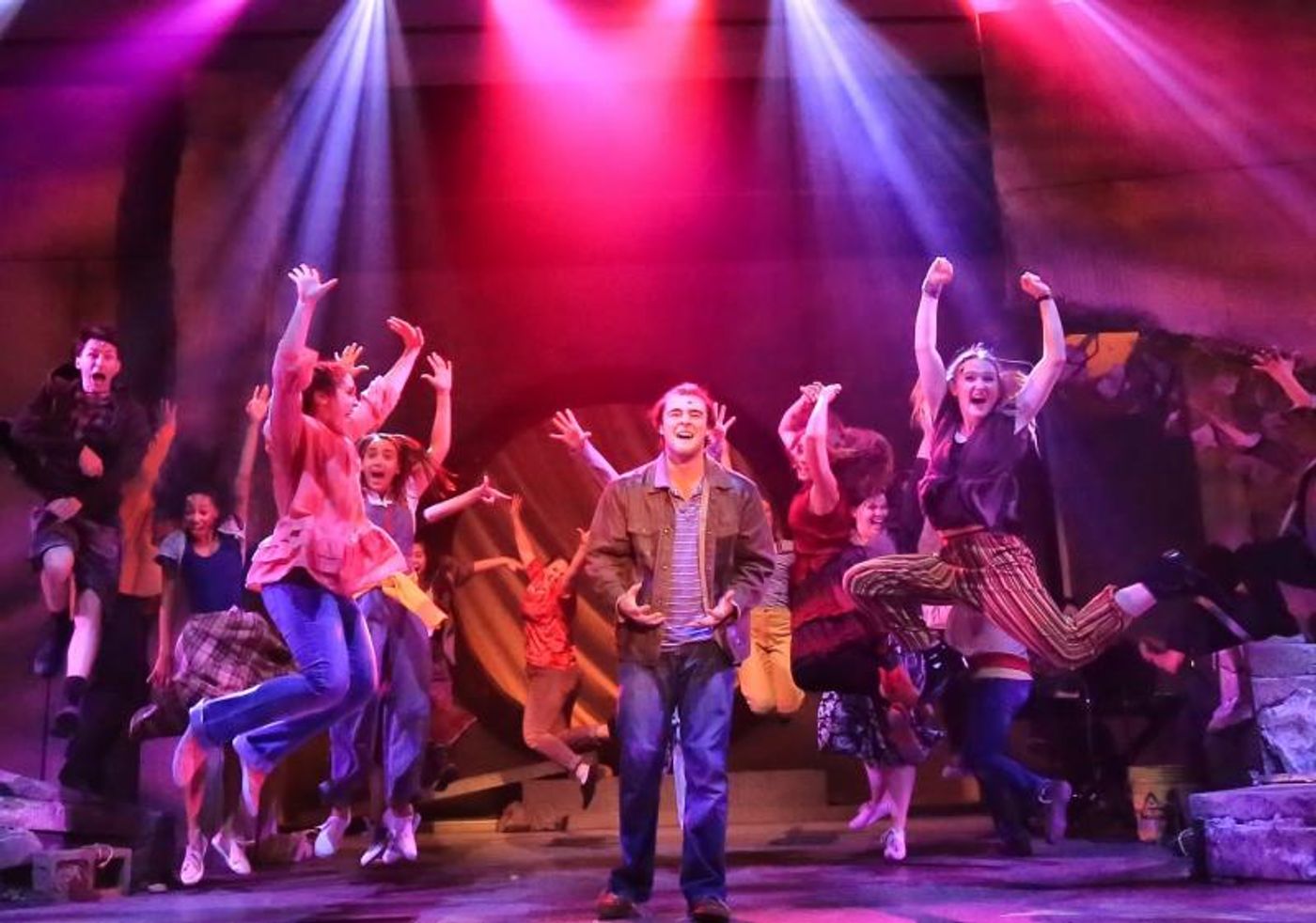 The evocation of its Middle Eastern setting gives Godspell an immediacy that ensures audiences will respond in a far more visceral way. Throughout the play, one hears the sound effect of a low, rumbling, almost percussive nature - Could it be thunder? Could it be the explosion of IEDs? - that are at once off-putting, even frightening, and also completely expected given its setting. As each scene dovetails into the next, it becomes clearer that the people gathered onstage, the disciples and followers of Christ, are refugees, emigres seeking a more peaceful home in which to love and live. The intermittent, yet unrelenting, sound of improvised explosive devices serves as both a reminder of that from which they are fleeing and the unyielding and pervasive danger that accompanies life, seemingly in every part of the world, in the first quarter of the 21st Century.
The evocation of its Middle Eastern setting gives Godspell an immediacy that ensures audiences will respond in a far more visceral way. Throughout the play, one hears the sound effect of a low, rumbling, almost percussive nature - Could it be thunder? Could it be the explosion of IEDs? - that are at once off-putting, even frightening, and also completely expected given its setting. As each scene dovetails into the next, it becomes clearer that the people gathered onstage, the disciples and followers of Christ, are refugees, emigres seeking a more peaceful home in which to love and live. The intermittent, yet unrelenting, sound of improvised explosive devices serves as both a reminder of that from which they are fleeing and the unyielding and pervasive danger that accompanies life, seemingly in every part of the world, in the first quarter of the 21st Century.
That knowledge underscores the realities of life for the characters assembled onstage and it continues to reverberate through the hearts and mind of every audience member who gives himself (or herself) over to the magic of theater to see and to feel what might be - forcing them to consider their own responses to the constant threat of cataclysm and choosing the right way, the altruistic way, to deal with the growing refugee crisis all over the world.
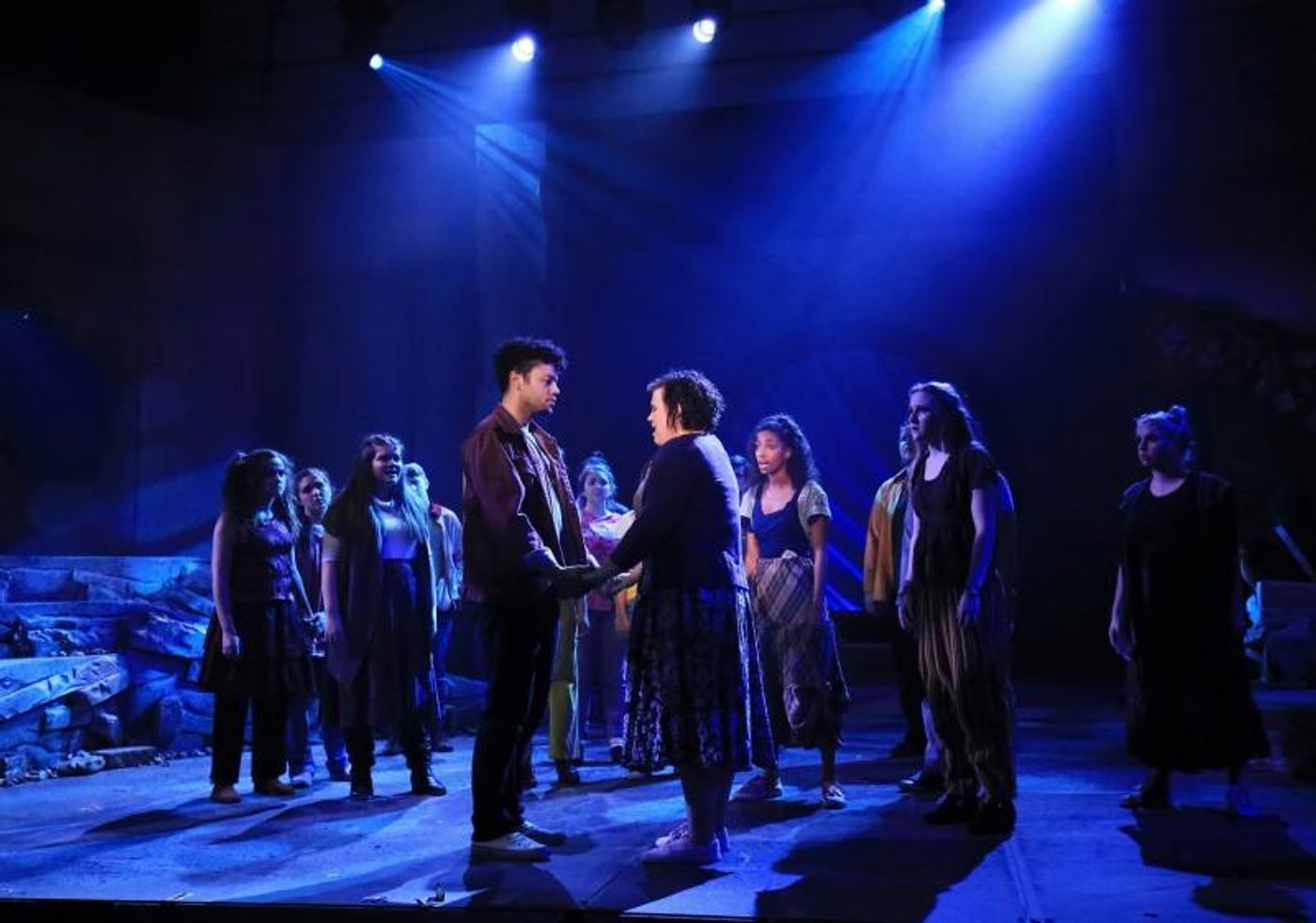 While that sounds rather heavy-handed and, granted, it could be presented in a didactic manner, Baker and his creative team have instead chosen to give Godspell a far more joyful sense of discovery that provides inspiration for audience members who find themselves lost in thought after the final curtain falls.
While that sounds rather heavy-handed and, granted, it could be presented in a didactic manner, Baker and his creative team have instead chosen to give Godspell a far more joyful sense of discovery that provides inspiration for audience members who find themselves lost in thought after the final curtain falls.
With a cast of actors primarily in their late teens and early 20s, Baker's production of Godspell is lively and fast-paced - the music provided by Stephen Schwartz is performed with terrific focus, with loads of imagination and creativity to make certain every number lands exactly where and how it should. Much of the credit for that goes to choreographer Kari Smith, whose efforts have never been more visually stunning. Smith's choreography for Godspell is clever and inventive, and she makes grand use of the Collins Alumni Auditorium stage to keep her actors moving all over the place. With confidence and determination, the members of the ensemble perform Smith's choreography in a way that will leave you breathless and, very possibly, awestruck.
Confident and self-assured, music director Kelsi Fulton and her six-person band, which includes Tim Calhoun, Lindsey Miller, Zak Kuhn, Dan Kozlowski and John Mark Painter, perform Schwartz's score with estimable talent and apparent skill.
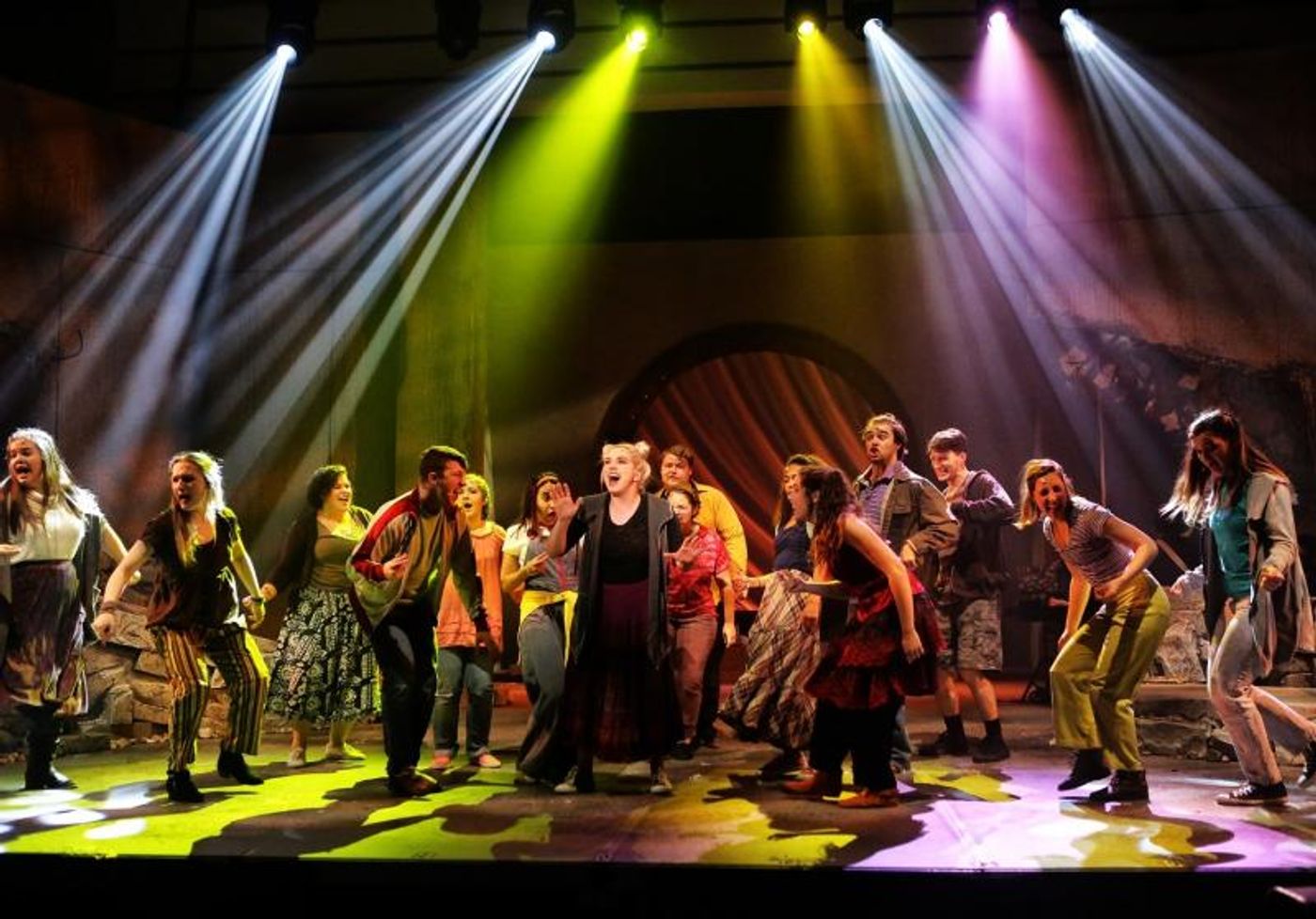 James is charming and gracious as Jesus Christ, proving himself a capable leading man in Baker's production. Never once does James make a false move or display a lack of understanding for his divine character. Instead, he makes him flesh and blood and all the more compelling with a well-modulated performance. James seems equally at ease whether he is being engaging and amusing, or when he delivers a sermon with the zeal of a preacher who'd be at home in the pulpit of an evangelical church on any given Sunday morning.
James is charming and gracious as Jesus Christ, proving himself a capable leading man in Baker's production. Never once does James make a false move or display a lack of understanding for his divine character. Instead, he makes him flesh and blood and all the more compelling with a well-modulated performance. James seems equally at ease whether he is being engaging and amusing, or when he delivers a sermon with the zeal of a preacher who'd be at home in the pulpit of an evangelical church on any given Sunday morning.
Likewise, Sam Kell displays a stunning versatility in his dual roles of John the Baptist and Judas, portraying each with notable skill and showing off his musical theater bona fides in the process. One of a talented cadre of student actors, Kell nonetheless distinguishes himself with a performance that somehow manages to be both passionate and understated.
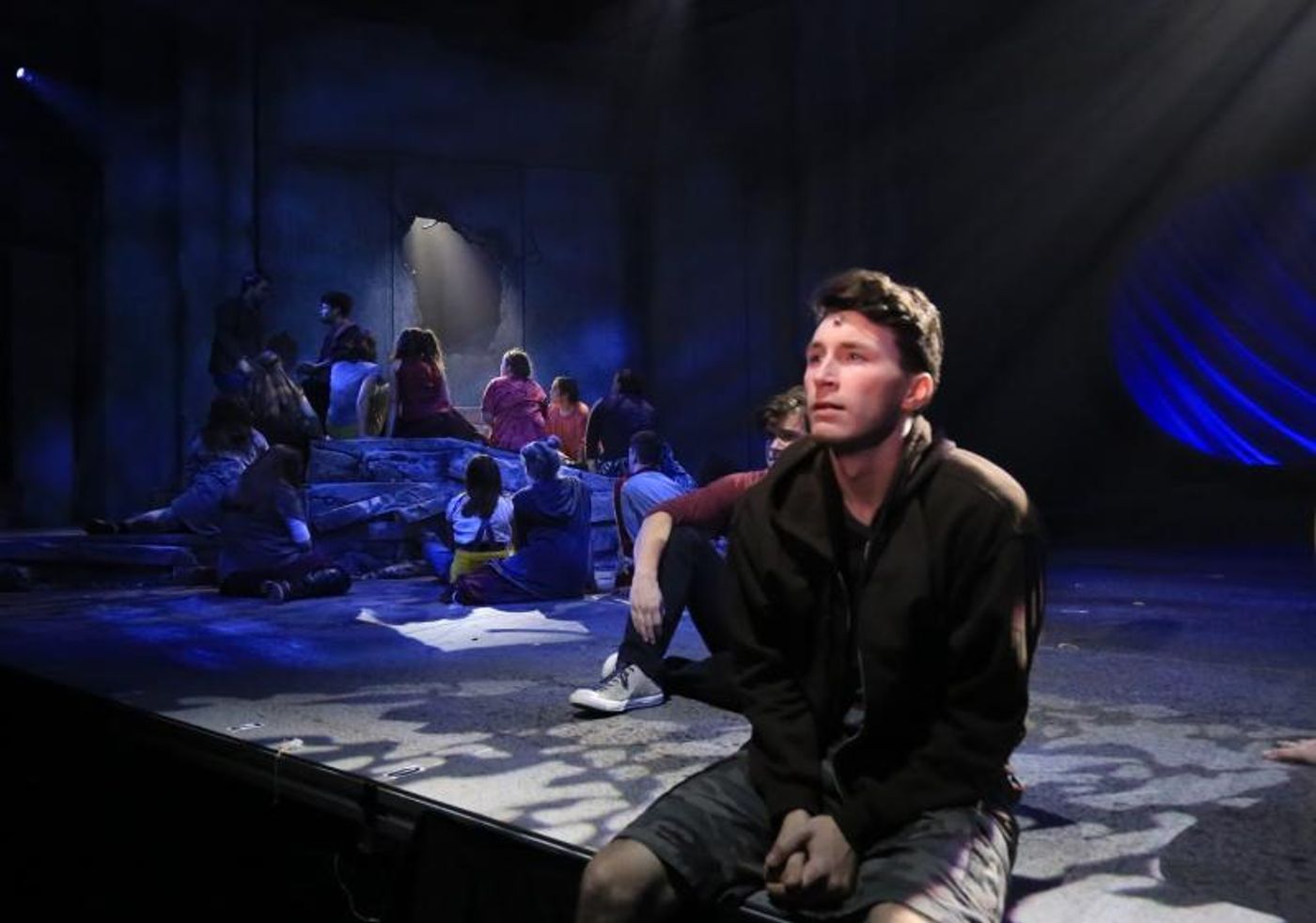 Baker's cast performs seamlessly as a whole, and individually each cast member is given an opportunity to take their moment in the spotlight. Notable among them are Hatty King's stirring Act Two performance of "Turn Back, O Man," which she performs with amazing stage presence, showing off her glorious voice to perfection. Similarly, Easton Curtis leads the entire ensemble's fervent performance of "We Beseech Thee" with startling confidence. Lauren Yawn, who has made a name for herself in previous productions in which we've had the pleasure to see her (she was great as Amalia in last season's mainstage production of She Loves Me and she gave a searing - and somewhat unexpected - performance in the title role of Second Stage Student Theatre's Hedda Gabler earlier this year), once again proves herself to be a performer of extraordinary promise.
Baker's cast performs seamlessly as a whole, and individually each cast member is given an opportunity to take their moment in the spotlight. Notable among them are Hatty King's stirring Act Two performance of "Turn Back, O Man," which she performs with amazing stage presence, showing off her glorious voice to perfection. Similarly, Easton Curtis leads the entire ensemble's fervent performance of "We Beseech Thee" with startling confidence. Lauren Yawn, who has made a name for herself in previous productions in which we've had the pleasure to see her (she was great as Amalia in last season's mainstage production of She Loves Me and she gave a searing - and somewhat unexpected - performance in the title role of Second Stage Student Theatre's Hedda Gabler earlier this year), once again proves herself to be a performer of extraordinary promise.
Payton Dishman displays a flair for comedy and a zest for movement throughout the show, while the remainder of the cast - Annika Burley, Katie Chance, Abby Charles, Daysha Collins, Logan Dozier, Elizabeth Golden, Ellen Goodling, Jonathan Killebrew, Merrie Shearer, Brooklyn Thompson and Abby Wyatt - prove equally capable of stealing the show, probably any show, with their impressive talents.
Godspell. Book by John Michael Tebelak. Music and new lyrics by Stephen Schwartz. Directed by Scott Baker. Choreography by Kari Smith. Musical direction by Kelsi Fulton. Presented by Lipscomb University Theatre. At Collins Alumni Auditorium, Lipscomb University, Nashville. Through November 11. Running time: 2 hours, 10 minutes (with one 15-minute intermission).
production photos by Kenn Stilger
Reader Reviews
Videos

